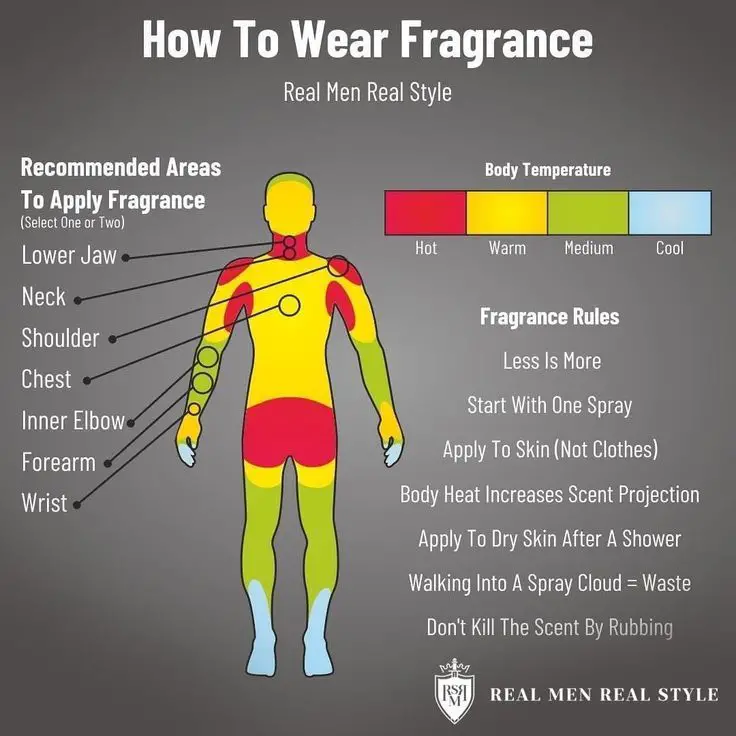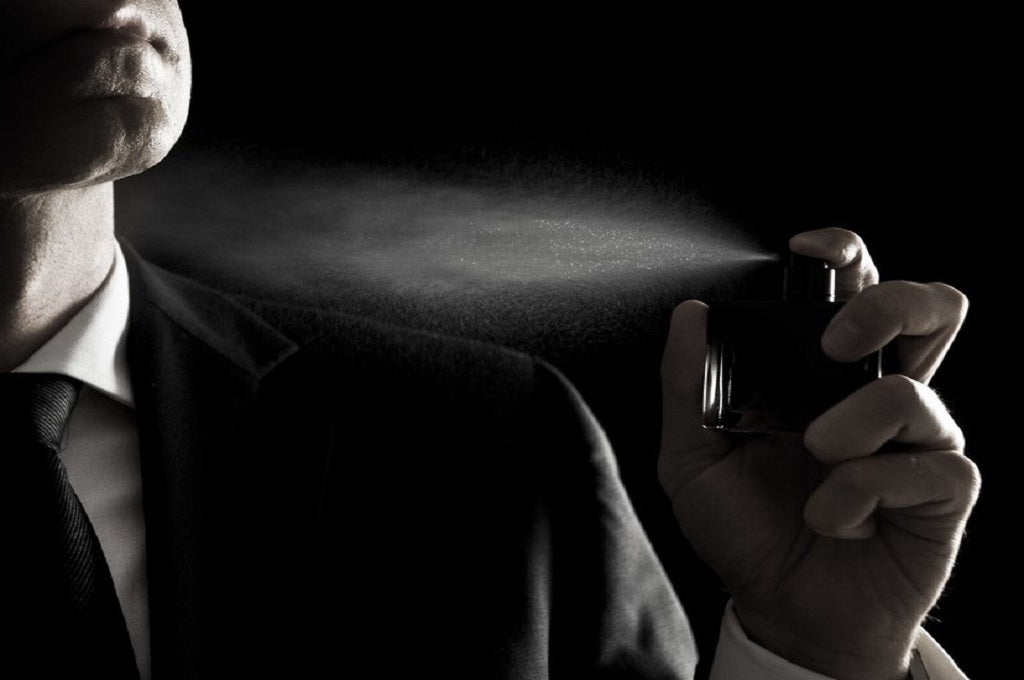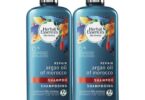Spray perfume on your pulse points, such as wrists, neck, and behind the ears. Perfume application is an essential part of personal grooming, adding a touch of elegance and individuality to one’s appearance.
When it comes to where to spray perfume, it is crucial to target the body’s pulse points. These areas tend to generate more heat, helping to emit the fragrance gradually throughout the day. The most common pulse points to apply perfume are the wrists, neck, and behind the ears.
By strategically spritzing perfume on these areas, you ensure that the fragrance lingers and develops its full potential. However, it is important not to overdo it, as excessive application can be overwhelming. Understanding the art of perfuming oneself contributes to a harmonious blend that can leave a lasting impression.
The Science Behind Perfume
Perfume application is a complex science. Fragrances are not simply sprayed onto the body. Instead, they go through a process that involves understanding fragrance notes and composition. Each perfume has its own unique blend of scents, with top, middle, and base notes.
These notes interact differently with body chemistry, resulting in a unique scent for each individual. The top notes are the initial scents that are detected when the perfume is first applied. They typically last for about 15 minutes before they fade away.
The middle notes, or heart notes, develop after the top notes evaporate and can last for several hours. Finally, the base notes emerge as the last layer of the perfume’s scent, and they have the longest staying power. By understanding the science behind perfume, you can better appreciate its artistry and select the perfect scent for you.
Finding The Best Spots To Apply Perfume
When applying perfume, it’s essential to know the best spots for optimal scent diffusion. Pulse points, such as the wrists, neck, and behind the ears, are commonly used areas. However, exploring unconventional spots can create a unique fragrance experience. The back of the knees, inside the elbows, and the small of the back are lesser-known pulse points to consider.
You can also try spraying perfume on your hair, clothes, or even on a handkerchief. By experimenting with different areas, you can enhance the longevity and sillage of your fragrance. So, have fun discovering new spots and create a signature scent that is both captivating and long-lasting.
Mist Or Spray: Which Application Method Is Right For You?
When it comes to applying perfume, you have two options: mist or spray. Both methods have their own pros and cons. Mist application distributes the fragrance evenly over a wider area, giving a subtle and airy scent. However, it might be a bit challenging to control the amount of product sprayed, and it may not last as long as a spray.
On the other hand, spraying perfume allows for more precise application, targeting specific areas for a stronger and longer-lasting fragrance. Yet, it can be overpowering if too much is applied. Additionally, spraying may require extra caution to avoid accidental contact with clothes, which can cause staining.
Ultimately, the choice between misting and spraying perfume depends on personal preference and the desired intensity of the scent. Select the method that suits you best and enjoy the enticing aroma throughout the day.
Dos And Don’Ts Of Perfume Application
Properly applying perfume is essential for maximizing its effectiveness and avoiding common mistakes. One important factor to consider is the distance at which you spray perfume. It is recommended to hold the perfume bottle about six to eight inches away from your body before pressing down on the nozzle.
This allows the fragrance to disperse evenly without overwhelming the senses. Avoid spraying the perfume too close to your skin, as it can result in an overpowering smell or potential staining on clothing. Another vital aspect is knowing where to spray perfume.
Focus on pulse points, such as the wrists, neck, and behind the ears, as they emit heat, which enhances the fragrance’s longevity. By following these simple guidelines, you can ensure that your perfume application is perfect every time.
Making Perfume Last Longer
To ensure your perfume lingers throughout the day, try layering techniques for enhanced longevity. Start by applying a matching scented body lotion or oil before spraying your fragrance. This will create a base for the perfume to adhere to, making it last longer.
Next, focus on pulse points such as your wrists, neck, and behind the ears, as these areas generate heat and help the scent project. Remember to spray from a distance to prevent overpowering the fragrance. Additionally, consider applying perfume to your hair or clothes for a subtle and long-lasting scent.
Finally, avoid rubbing your wrists together after applying perfume, as this can break down the fragrance molecules. By following these tips, you can maximize the life of your favorite perfume and enjoy its captivating aroma all day long.
Perfume For Different Occasions
Choosing the right perfume for different occasions is crucial. For daytime wear, opt for light, fresh scents. These scents should be subtle and not overpowering. Floral or citrus notes work well for a relaxed daytime atmosphere. However, when it comes to special events, you can experiment with richer, bolder fragrances.
These occasions call for more sophisticated and memorable scents. Oriental or woody perfumes can add a touch of elegance and allure to your overall look. Consider the venue and dress code when selecting a fragrance. Remember, the right perfume can enhance your confidence and leave a lasting impression.
The Impact Of Climate On Perfume Application
Applying perfume can be influenced by the climate. In hot weather, it’s important to adjust your fragrance routine. On warmer days, apply lighter scents that won’t be overwhelming. Opt for fresh, citrusy or floral notes that will complement the heat.
Also, consider spraying your perfume on clothing or hair instead of directly on your skin to prevent it from evaporating quickly. In colder climates, you can experiment with richer and warmer fragrances. These scents tend to last longer and provide a cozy feeling in winter.
However, avoid applying too much as the cold weather can intensify the scent. By adapting your perfume application to the climate, you can ensure that you smell great while also considering the environmental factors around you.

Credit: www.amazon.com
Perfume Maintenance And Storage
Properly storing perfume bottles is essential for maintaining their freshness and quality. To preserve the longevity of your fragrance collection, here are some tips to follow. Firstly, store your perfumes in a cool, dry place away from direct sunlight. This helps prevent the fragrance from deteriorating due to heat and light exposure.
Secondly, keep the perfume bottles tightly sealed to prevent air from entering and altering the scent. Avoid placing them in humid environments, like bathrooms, as moisture can degrade the fragrance. Additionally, refrain from storing perfumes in extreme temperature conditions, such as freezing or excessively hot areas.
Finally, always ensure the bottles are stored upright to avoid leakage and potential damage. By implementing these guidelines, you can extend the lifespan of your perfumes and enjoy their fresh and invigorating scents for longer periods.
Exploring New Perfume Trends
Shifting away from traditional fragrance applications, perfume enthusiasts are embracing innovative methods. Niche perfumes are gaining popularity, offering unique scents to suit individual tastes. Instead of spraying perfume on the usual pulse points, people are discovering alternative areas to enhance the fragrance experience.
The rise of niche perfumes has also led to the development of unconventional application techniques. Some individuals choose to spray perfume on their hair or clothes, while others prefer misting it on specific objects. By experimenting with different application methods, perfume lovers can create a personalized and captivating scent that reflects their individuality.
Whether it’s applying perfume to a scarf or using a fragrance mist for the home, these innovative practices allow for a more diversified and creative fragrance experience. The industry’s focus on unique scents and alternative application methods ensures a vibrant and ever-evolving perfume landscape.
Where Do You Spray Perfume: Summing It Up
Perfume application is crucial for an alluring fragrance that lingers throughout the day. The key to applying perfume effectively is knowing where to spray it. Spritzing perfume on pulse points, such as the wrists, neck, and behind the ears, allows the scent to develop and unfold naturally.
Targeting these areas maximizes the exposure of fragrance to the air, promoting a longer-lasting and more noticeable scent. Additionally, spraying perfume on the hair and clothing can enhance its longevity. However, it’s important to be mindful and not overdo it, as perfumes can be overpowering if applied in excess.
Remember, less is more when it comes to perfume application. Following these tips will help you make the most of your favorite fragrances, leaving a lasting impression wherever you go.
Frequently Asked Questions On Where Do You Spray Perfume
Where Do You Spray Perfume Exactly?
Spray perfume on pulse points: wrists, neck, inside elbows, behind knees, and ankles.
Do You Spray Perfume On Your Skin Or Clothes?
Spray perfume on your skin for a longer-lasting scent, not on your clothes.
Where Do You Spray Perfume To Last Longer?
Spray perfume on pulse points like wrists, neck, and behind ears for a longer-lasting fragrance.
Should You Spray Perfume On Chest?
It’s better not to spray perfume directly on your chest because it can cause irritation and damage to your skin.
Conclusion
Knowing where to spray perfume is essential for maximizing its effects and longevity. By applying perfume to pulse points like the wrists, neck, and behind the ears, you can enhance the fragrance’s diffusion and longevity. These areas generate heat, helping to activate the perfume’s scent and allowing it to gradually release throughout the day.
However, it’s important to avoid rubbing the perfume into the skin as this can disrupt the molecular structure and alter the scent. Instead, simply let the perfume dry naturally after applying. Additionally, considering the occasion and environment can also be key in determining where to spray perfume.
Lighter scents can be applied more liberally for a refreshing and subtle aroma, while more intense fragrances may require a more discreet application. Ultimately, experimentation and personal preference are key when it comes to finding your perfect perfume application routine.











